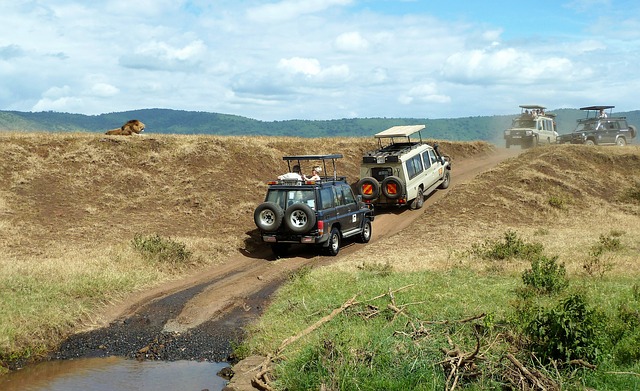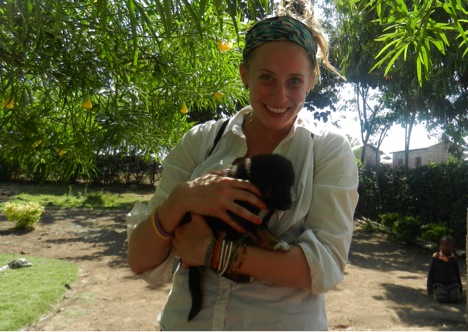Tired of Being Mzungu in Tanzania

I leave Tanzania in three days and it’s time to go. It’s been three months of cold showers, upset stomachs, and tough lessons, perhaps the toughest of which was this: I will forever be a tourist here. No matter how long I stay or how many local kids I love or how good my Swahili gets, I will never fit in. I can’t escape the label that my skin sticks bright and clear on my forehead. I am just a mzungu, only a white person.
That’s all there is to me. I am not a friend, not an enemy, sometimes not even a fellow human, but a representation, a generalization, water to oil. I am here to give things: my time, money, toys and clothes. These things are my identity.
A few times a week a volunteer like me, walking innocently along, not bothering anyone, is approached by kids or grown-ups (usually kids) who hold out a flat palm and demand in a hard voice, “Give me my money!” First of all, none of us carry large amounts of money with us because a) we don’t have much – we’re volunteers, remember? – and b) we might get mugged.
The habit of expecting money from mzungus is engrained in their culture. Somebody taught them this, and that somebody is not going to teach them otherwise.
Our standard response is to imitate them: we hold out our hands and say, “You give me my money!” But it never does any good. The habit of expecting money from mzungus is engrained in their culture. Somebody taught them this, and that somebody is not going to teach them otherwise.
As far as I can tell, the confusedness of race relations here for the most part stems from nothing more hostile than ignorance, passed down through the generations. There were maybe two or three Tanzanians on my flight from Amsterdam to Kilimanjaro; the rest of us were American or European tourists. Whereas in the west travel for leisure is a popular pastime, the majority of Tanzanians cannot afford such a hobby.
I don’t think they get out of their country much, and especially not off their continent.
Most of them don’t have televisions, cutting off access to documentaries and international news channels. They must eventually study history or geography in school, but I have no idea whether the national curriculum includes any study of Europe or Asia, for example, or North America.
No, I am not rich. I’m not poor like you, but I’m not rich like you think I am. One of the things I’m most looking forward to about going home is getting away from all the attention people pay us in the street here due one hundred percent to the color of our skin.
I know that my students didn’t even know Tanzania was part of Africa, so I’m not holding out much hope for the existence of vast world knowledge on their part. Due probably in part to this lack of understanding, everything is black and white to most Tanzanians I’ve encountered – literally black and white.
No, I am not rich. I’m not poor like you, but I’m not rich like you think I am. One of the things I’m most looking forward to about going home is getting away from all the attention people pay us in the street here due one hundred percent to the color of our skin. I often walk part of the trip to and from work with other volunteers.
Daladala conductors grab our wrists; taxi and bodaboda drivers shout after us offering rides; we hear hisses, catcalls, whistles, shouts.
Generally I choose not to respond, a habit acquired from months of receiving this treatment. If I’m in a good mood I’ll offer a simple, quiet greeting and/or a small smile in return.
Mostly people just holler “Mzungu!” or “Hey ‘zungu!” Generally I choose not to respond, a habit acquired from months of receiving this treatment. If I’m in a good mood I’ll offer a simple, quiet greeting and/or a small smile in return. Always dissatisfied, they keep yelling. They shout harshly at my back after I walk past: “Mzungu! Mzungu! Ay, mzungu! ‘Zungu! MA-ZUNG-U!”
These are not hostile greetings, but neither are they friendly; locals speak to me on the street in exactly the kind of tone you might use with a disobedient dog named Mzungu.
Our natural first reaction is to think, “Would you like it if you were walking down the street and I yelled ‘hey, black person!’ at you? Because it’s the same thing.” I want to inform these people that I do have an actual name, and it is not “mzungu.” That word’s definition encompasses, in my opinion, only a small portion of my identity – but to them, it’s all I have to offer. For this reason and for the manner in which it is often delivered, I’ve come to find it offensive.
I think that while it is not intended as such on every occasion, “mzungu” definitely crawls with shades of not-so-nice connotations, especially used, as one volunteer heard it, in the context of a hospital delivery room.
I think that while it is not intended as such on every occasion, “mzungu” definitely crawls with shades of not-so-nice connotations, especially used, as one volunteer heard it, in the context of a hospital delivery room. Women here give birth without much medication and if they scream or cry during labor, they’re mockingly called mzungus. That’s funny because it’s true, but not so flattering, hm?
Frankly, I have never in my life been on this end of racism and I hate it. But after I have time to cool down after particularly frustrating incidents, I consider that perhaps it’s good for me to feel this way, to be treated like this. I understand that people with so little might feel resentful of people with so much that they can afford to give it away, who can afford to work for free.
And so many people every day all over the world fall victim to abuse because of the color of their skin, but rarely does this happen to white people – we’re overdue for a little battering around, you might say. I’ve found that I don’t handle it as gracefully as I should.
I’ve found that I’m ready to go home and not hear that grating, segregating word ever again.

Tired of Being Mzungu in Tanzania
Related Reading
- Zanzibar Tourism: Describing My Home to the People of Zanzibar
- Girls Getaway to Zanzibar
- Volun-touring Versus Volunteering in Zanzibar
- The Truth About Zanzibari Men
- I Buried My Heart in Zanzibar
Have you traveled to Tanzania? What were your impressions? Email us at editor@pinkpangea.com for information about sharing your experience and advice with the Pink Pangea community. We can’t wait to hear from you.
Tired of Being Mzungu in Tanzania top photo credit: pixabay









or alternatively is that it is a derivative of kuzunguka i.e. people that wander around.
The root meaning to “mzungu”:
Mizungu means strange objects or tools that you need to be taught how to use. So the people with the strange objects, the colonials with their guns, bicycles, etc, became “wazungu” the people of strange things. Sawa mzungu?
I found your blogg by accident and read it and feelt I had to comment. The word mzungo doesn’t mean “white person”. Thinking in black and white you’re the one that have mad a false assumption… Sorry to say. I suggest you research the background of the word or ask an educated tanzanian person. It’s definitely NOT the same thing as you shouting to somebody “hey black person!”… Again your looking at this in black and white. In the exact same way you’re accusing others of doing. You’re also generalizing, something you’re also accusing tanzanians people of doing when they see a white person.
I’ve been in your situation and recognize a lot of the stuff your writing about. But you have to remember that you are a tourist in a foreign country. You can’t generelize a whole population of being beggers that expect hands out from “mzungos”. Or assumptions about the school system that you don’t know anything about. Do you think that’s fair? There a poor people all over the world. In some places there are more than others. Same thing with uneducated people, muggers, thiefs, and son. It has nothing to do with the culture.
The feeling of never fitting in a foreign country can be attributed to every country in the world with a population of immigrants. You should turn that feeling into a life lesson.
1. Look up the difference of rascism and discrimination!
2. Look up the REAL meaning of mzungo! A similar meaning you can find in almost every post colonialized country.
Muzungu is used by Dr. Livingstone to hide people, it means “I don’t see you” in Arabic. laa shufnak, maashufnak, maa shufna, (he does DR LIVINGSTONE does not see you, meaning, you don’t have to worry about been spotted, he wont tell the bad guys where you are. also, Susi and Chuma where muslims remember? Suni (Muslim) and Chuma (Mosque).
Oh loved reading this and I know exactly the feeling and that you will always be different. I’ve lived in Tanzania for any years and now I’m in Kenya.
However, once your Kiswahili gets better and you can quickly turn around when they shout “Mzungu”and say
“Tanzanian!” or “Kenyan”
“my name isn’t mzungu”,
“don’t be stupid”
“Is that the best you learned from school” or “go back to school” which makes them feel very stupid,
and my favourite if it’s really a bad situation is “don’t be an asshole”
Usually I get an apology – but sometimes the effort is draining..lol.
If I got from a school and I had time I would go into the school and have a serious word with the Principal. That’s not on!
It is best to look up the word and its meaning instead throwing those insults around: –
Mzungu
From Wikipedia, the free encyclopedia
Mzungu (pronounced [m??zu??u]) is a Bantu language term used in the African Great Lakes region to refer to people of European descent. It is a commonly used expression among Bantu peoples in Kenya, Tanzania, Malawi, Rwanda, Burundi, Uganda, Democratic Republic of Congo and Zambia, dating back to the 18th century. Literally translated it meant “someone who roams around” or “wanderer.”[1] The term was first used in the African Great Lakes region to describe European explorers in the 18th century, apparently as a result of their propensity to get lost in their wanderings in Africa. The word Mzungu comes from Kiswahili, where ‘zungu’ or ‘zunguka’ is the word for spinning around on the same spot. The word was assigned to the first white people arriving in the African Great Lakes because they often became lost. Kizunguzungu is Kiswahili for a dizziness.[2] The term is now used to refer to “someone with white skin” or “white skin”.
The possessive kizungu (or chizungu) translates as “behaving rich”. However, in some areas, such as in Rwanda and Burundi, it does not necessarily refer to the colour of one’s skin. Traditionally Europeans were seen to be people of means and rich and so the terminology was extended to denote affluent persons regardless of race.
This is BRILLIANT. Encompasses my exact thoughts on the term perfectly. The worst is walking past a school in rural kenya; it’s an absolute chorus, overwhelming.